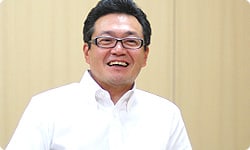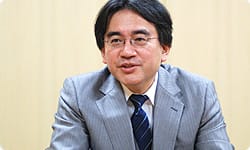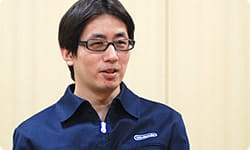Updating the Graphics
We have decided to re-release Super Mario All-Stars1 for the Wii console. This compilation was previously released for the Super Famicom (Super NES). When I looked into who was in charge of the previous release, your names came up, Sugiyama-san and Mori-san. That's why I suddenly asked you to join me today.
This really caught me off guard! (laughs) It was quite a long time ago.
So today "Iwata Asks" people who may not remember very much. (laughs)
(laughs)
Thanks for coming.
Thank you for having us.
| 1 |
When I heard about today's interview, I rushed to my closet, pulled out my Super Famicom and Mario All-Stars and reacquainted myself! (laughs)
(laughs) How did it feel to play it after so long?
It's fun to play even today, and my fingers move all on their own!
Your fingers remember! (laughs)
They sure do! It's weird. (laughs) Even though I hadn't played it for so long, I remembered exactly where to hold the buttons tight and so on...
Did you remember a lot about developing Super Mario All-Stars 17 years ago?
Not at all... (laughs)
Even though your fingers remembered how to play it so well? (laughs)
My memory is really vague. (laughs)
You're both still active on the front lines of development, but what were each of you doing back when you made Super Mario All-Stars for the Super Famicom system?
Someone else was the main director. I lent support as an assistant director and designer.
I was designer in about my third year with the company.
Do you remember how it was decided to make Mario All-Stars?
If I remember correctly, Miyamoto-san brought it up a little while after development of Super Mario Kart2 had ended. He wanted to create a value pack combining all the Super Mario series games. I think the idea was to include the Lost Levels3, a game not many had played on the Disk System, thereby giving people another opportunity to play it.
| 2 |
| 3 |
So it began with the idea of taking the four Super Mario titles for the Famicom, remaking them for the Super Famicom, and offering them together as a great deal.
Right.
Are the specifications for Super Mario All-Stars still around?
(bluntly) No.
(laughs)
They're gone. When I heard about this interview, I looked all over, but came up empty-handed. Sorry.
All I could find where I worked on it was a few scribbles on a scrap of paper.
We still wrote things down by hand back then.
Yeah.
What's really miraculous is how Nakago-san4 has kept materials from over 25 years ago. Since nothing remains from that time, please do your best to recall what happened 17 years ago. (laughs)
How did development of Super Mario All-Stars begin? Did it begin with analysis of the programming of Nintendo's own games?
SRD5 did the original programming, so...
SRD was in charge of the programming for the 2D Mario games starting with Super Mario Bros.
Right. So that made some things easier.
The people who created the original games were involved, so you could consult the actual developers.
Right.
| 4 |
| 5 |
But all the data for the graphics wasn't still around, so I doubt it was easy work. Mori-san, as a designer, what did you begin work on?
The first thing I was told to do was update the graphics.
You were going to run Famicom (NES) software on a Super Famicom, so you needed to update the old graphics. But weren't you a little intimidated?
Yeah. At first I was. (laughs) When I heard that I was supposed to update the graphics for a Mario game-and not just any Mario game but the original Super Mario-I was like, "Huh?! Is it all right for a guy only in his third year here to do that?"
Super Mario Bros. is Nintendo's flagship title, so you wondered if it was all right for you to touch it.
Yeah. And if I remember correctly, the first thing I was asked to do was redraw the first Bowser's castle that appears. There weren't many components to that castle in the original Famicom version.
For the Super Famicom, you could put together a lot of parts.
Yes. We had to assemble components for the Super Famicom version, too, but we had quite a lot of parts to use.That castle is one of the first things players see, so I was under a lot of pressure, and I spent a lot of time on it.
Super Mario All-Stars has four games in it. Which ones did you work on?
I worked on the BG, that's how we called it back then, for the first Super Mario and Super Mario Bros.: The Lost Levels. I was responsible for using the increased number of colors available and lots of tiles to redo the BG graphics one by one in order to update them for the Super Famicom.
You just used the abbreviation BG. Perhaps I should explain. Back in the days of the Famicom, Super Famicom and the first Game Boy system, we abbreviated the word background to BG. You made it by filling up the space with 8x8-pixel components called tiles.
Right. I think I did all the objects and about half the BG for Super Mario Bros. 2.6
| 6 |
Maybe I should also explain what we mean by objects. Objects are those things like Mario or Koopa Troopas that move around in front of the BG. They were made to be moved on a scale of one pixel, so we called them moving objects. Abbreviate that and you get "OBJ" or "object." Back then, we were making games using abbreviations like BG and OBJ that the average person wouldn't understand at all.
Right. Thanks. (laughs)
I was a developer back then, too! (laughs) To sum up, you could do a number of new stuff with the Super Famicom, like use more colors and components, so it was your job to make richer graphics in accordance with that.
Right.
You weren't simply creating a copy, you had to rework it for the Super Famicom.
Right. In the collection, Super Mario Bros.: The Lost Levels, in particular, were different from their originals. We fashioned the characters somewhat after those in Super Mario World for the Super Famicom.
Yes, that's right. So we even put a black outline around Mario.



